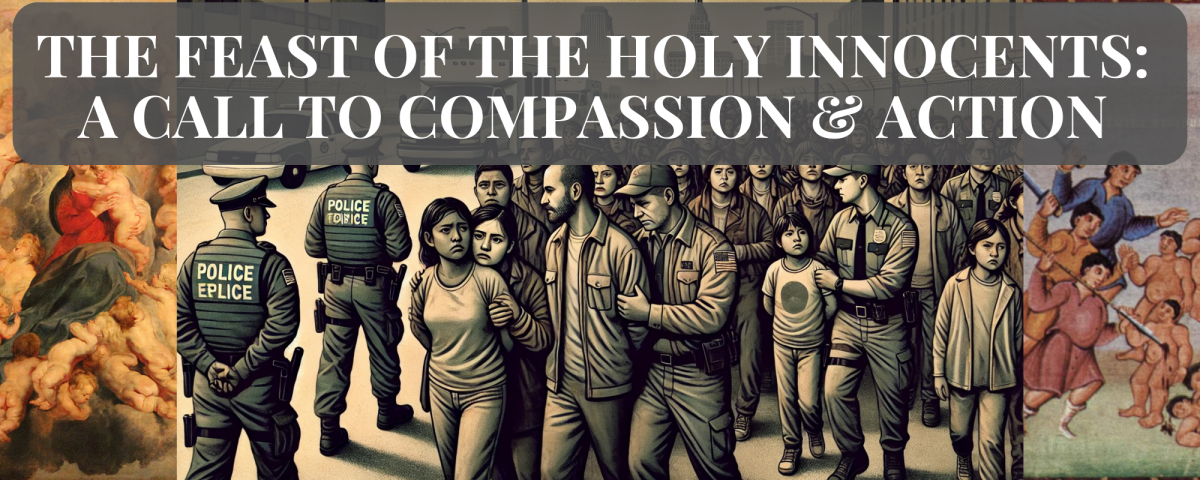
Each year, on December 28 (tomorrow), the Christian calendar observes the Feast of the Holy Innocents, commemorating the tragic events following Christ’s birth. The Gospel of Matthew recounts how King Herod, in a desperate attempt to eliminate the newborn “King of the Jews,” ordered the massacre of all male children in Bethlehem under the age of two (Matthew 2:16). This brutal act led to unimaginable grief among Jewish families and forced Mary, Joseph, and the infant Jesus to flee to Egypt, becoming refugees.
The story of the Holy Innocents is hauntingly relevant today as we confront the ongoing slaughter of innocents through violence, war, and systemic injustice. Around the world, millions are displaced from their homes due to persecution, conflict, and environmental disasters. Families risk everything to seek safety, while others face the devastating loss of children in acts of genocide and violence.
Christ as a Refugee
The Holy Family’s flight to Egypt underscores an essential truth: Christ began life as a refugee. This reality aligns Jesus with the struggles of displaced people everywhere. The United Methodist Church’s Social Principles remind us of our call to love and support migrants, refugees, and asylum seekers. As articulated in these principles, we are charged to “stand with, advocate for, and minister to migrants and refugees,” recognizing their inherent dignity and worth.
Modern-Day Innocents
Today, we see echoes of Herod’s cruelty in acts of violence and oppression worldwide. Genocide continues to devastate communities in Sudan, Gaza, and other regions. Closer to home, in Chicago, immigrants live in fear of mass deportations. A recent event highlighted chilling plans for “the largest domestic deportation operation in American history,” targeting Chicago as a starting point.
While deportations may not seem as overtly bloody as Herod’s massacre, they are no less cruel in the ways they disrupt families, sever relationships, and inflict trauma on vulnerable populations. We must ask ourselves: What is the church’s response to these modern-day Herod’s?
A Call to Action
To me the Christian response is clear. Scripture commands us to care for the stranger and the sojourner. Exodus 23:9 declares, “You shall not oppress a sojourner. You know the heart of a sojourner, for you were sojourners in the land of Egypt.” This call resonates with Christ’s own life and ministry, which emphasized welcoming the marginalized and oppressed.
Our congregation is not powerless. We can act:
- Pray: Lift in prayer those living under the threat of deportation and families facing separation. Pray for peace, justice, and compassion to guide leaders’ decisions.
- Advocate: Stand up against policies that perpetuate harm. Support efforts to uphold the dignity and safety of migrants and refugees, both locally and globally.
- Support: Our Church in Society Committee is actively monitoring the situation and preparing to lead us in living out our Social Principles. Through outreach, education, and advocacy, we can extend a lifeline to those in need.
- Welcome: Create a sanctuary in our hearts and church for all who seek refuge. Small gestures of kindness and support can affirm the humanity of those who feel discarded by society.
A Season of Hope
The Feast of the Holy Innocents challenges us to see the face of Christ in the refugee, the migrant, and the victim of violence. It is a sobering reminder that the joy of Christ’s birth does not erase the pain and injustice of the world. Yet, as people of faith, we are called to be bearers of hope, living out God’s kingdom in tangible ways.
This season, let us recommit to embodying the love and grace of Christ. Let us work to ensure that no one feels alone in their struggles and that every person can live in dignity and peace.

